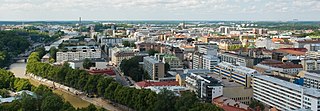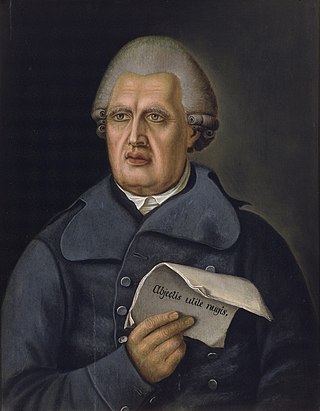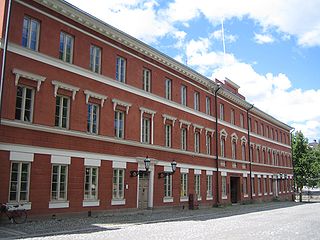
Turku is a city and former capital on the southwest coast of Finland at the mouth of the Aura River, in the region of Finland Proper (Varsinais-Suomi) and the former Turku and Pori Province. The region was originally called Suomi (Finland), which later became the name for the whole country. As of 31 March 2021, the population of Turku was 194,244 making it the sixth largest city in Finland after Helsinki, Espoo, Tampere, Vantaa and Oulu. There were 281,108 inhabitants living in the Turku Central Locality, ranking it as the third largest urban area in Finland after the Capital Region area and Tampere Central Locality. The city is officially bilingual as 5.2 percent of its population identify Swedish as a mother tongue.

The Royal Academy of Turku or the Royal Academy of Åbo was the first university in Finland, and the only Finnish university that was founded when the country still was a part of Sweden. It was founded in 1640. In 1809, after Finland became a Grand Duchy under the suzerainty of the Russian czar, it was renamed the Imperial Academy of Turku. In 1828, after the Great Fire of Turku, the institution was moved to Helsinki, in line with the relocation of the Grand Duchy's capital. It was finally renamed the University of Helsinki when Finland became a sovereign nation-state in 1917.

The University of Helsinki is a public research university located in Helsinki, Finland, since 1829, but founded in the city of Turku in 1640 as the Royal Academy of Åbo, at that time part of the Swedish Empire. It is the oldest and largest university in Finland with the widest range of disciplines available. In 2020, around 31,600 students were enrolled in the degree programs of the university spread across 11 faculties and 11 research institutes.

Åbo Akademi University is the only exclusively Swedish language multi-faculty university in Finland. It is located mainly in Turku but has also activities in Vaasa. Åbo Akademi should not be confused with the Royal Academy of Åbo, which was founded in 1640, but moved to Helsinki after the Turku fire of 1827 and is today known as the University of Helsinki.

Henrik Gabriel Porthan was a professor and rector at the Royal Academy of Turku. He was a scholar sometimes known as The Father of Finnish History.

Frans Michael Franzén was a Swedish-Finnish poet and clergyman. He served as the Bishop of the Diocese of Härnösand.

Carl Reinhold Sahlberg was a Finnish naturalist, primarily an entomologist specializing in beetles. He was the father of entomologist Reinhold Ferdinand Sahlberg (1811-1874), grandfather of entomologist Johan Reinhold Sahlberg (1845-1920), and great grandfather of Uunio Saalas (1882-1969).

Katedralskolan i Åbo is the Swedish-language upper secondary school of Turku, located at the Old Great Square.
Lilius is a surname. Notable people with the surname include:
Rut Irmelin Sandman Lilius is a Swedish-speaking Finnish writer.

Aleko Axel August Eugen Lilius was an explorer, businessman, diplomat, writer, journalist, and photographer of Finnish, Swedish, and Russian extraction. He has been described as an English journalist, a Russian Finn, an American of Finnish origin, a Swedish journalist and adventurer, and an intrepid American journalist. He is the author of I Sailed with Chinese Pirates, an account of the time he spent among pirates of the South China seas.
Yle Vega is a Finnish radio channel broadcasting in the Swedish language. It is operated by Finland's national public service broadcaster Yle, which has its headquarters in Helsinki.

Aurora Society was a secret society and a national Finnish literary society at the Royal Academy of Turku from 1770 to 1779. The Society consisted of many prominent members of the Finnish cultural sphere and had as its focal points poetry, Finnish history, geography and the research of language and economy.

The Academic Male Voice Choir of Helsinki, abbreviated AS, colloquially also known as Akademen, is a Finland-Swedish academic male-voice choir in Helsinki, Finland. The choir was founded in 1838 by Fredrik Pacius and is the oldest extant choir in Finland. It is one of two male-voice choirs affiliated with the University of Helsinki, the other being the oldest extant Finnish-language choir, the YL Male Voice Choir. Furthermore, it is one of two Swedish-language choirs affiliated with the University of Helsinki, the other being the Academic Female Voice Choir Lyran.
Lilius is a Finnish family that descend from the bailiff Hans Rainenius, who lived in Satakunta. His son Vicar Henrik Rainenius-Lilius (1590–1657) together with his three sons where the first to adopt the surname Lilius.

Svenskfinland is the common name for the areas in Finland where the majority of the Swedish-speaking population of Finland live. The Finland-Swedish information and cultural centre Luckan upholds a website featuring information about Finland's Swedish speaking minority in English; Svenskfinland.fi

Eteläsuomalainen osakunta (ESO) is one of the 15 student nations at the University of Helsinki, Finnish-speaking, established in 1905 and it has Uusimaa and Eastern Uusimaa as recruitment regions. Before 1905, Nylands Nation (NN) gathered both Finnish- and Swedish-speaking university students from Southern Finland, but seceded from NN in 1905 to form a similar, but Finnish-speaking nation.

Svenska fruntimmersskolan i Åbo or only Svenska fruntimmersskolan was a Girls' School in Turku in Finland, active from 1844 to 1955. Alongside its equivalent in Helsinki, Svenska fruntimmersskolan i Helsingfors (1844-1974), it was the first state school for females in Finland. From 1919, it was called Svenska flickskolan i Åbo.
The Stolen Death is a 1938 Finnish thriller film directed by Nyrki Tapiovaara. The story is set in the Grand Duchy of Finland in 1904, and is about a group of Finnish activists in Helsinki who develop into a revolutionary force for Finnish independence. The film is based on the 1919 short story "The Meat-Grinder" by Runar Schildt. Unlike the original story, the film is not set during the 1918 Finnish Civil War because of its sensitive subject at the time, but the events were set during the Russo-Japanese War instead.

Florakören vid Åbo Akademi, also referred to as simply Florakören or Flora, is a Finland-Swedish academic women's choir in Turku, Finland.














